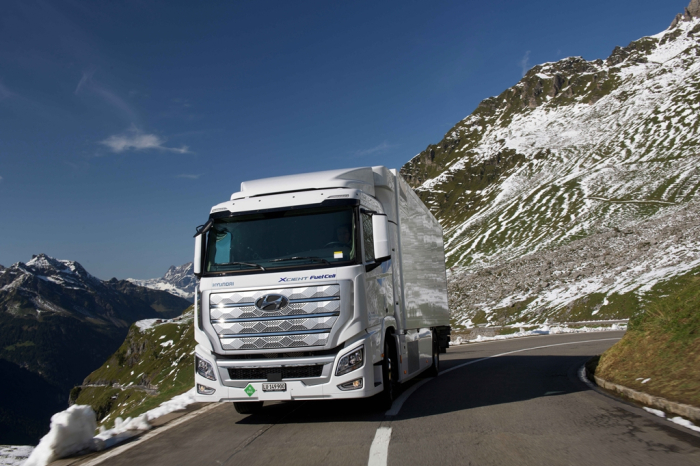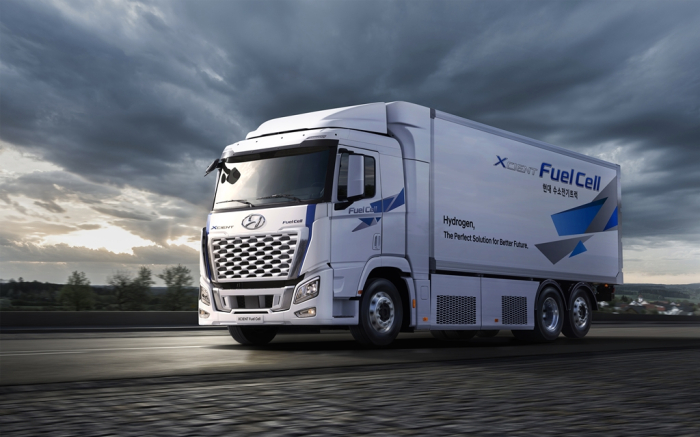Hydrogen vehicles
Fleet of Hyundai XCIENT hydrogen truck exceeds 1 million km benchmark
The automaker targets a 30% share of the European fuel cell truck market by 2030
By Jul 02, 2021 (Gmt+09:00)
2
Min read
Most Read
LG Chem to sell water filter business to Glenwood PE for $692 million


Kyobo Life poised to buy Japan’s SBI Group-owned savings bank


KT&G eyes overseas M&A after rejecting activist fund's offer


StockX in merger talks with Naver’s online reseller Kream


Mirae Asset to be named Korea Post’s core real estate fund operator



Hyundai Motor Co.’s fleet of fuel cell truck XCIENT has surpassed the benchmark one million kilometers of driving in 11 months of service in Switzerland, turning up the heat on rivals in the hydrogen-fueled vehicle segment.
Over that distance, the hydrogen-powered trucks have reduced carbon emissions by an estimated 630 tons compared to diesel-powered vehicles, Hyundai said on Friday.
The South Korean top automaker has shipped a total of 46 XCIENT heavy-duty trucks to Switzerland since July 2020, which are in service for 25 Swiss companies in logistics, distribution and supermarket fulfillment.
Hyundai’s XCIENT is the world’s first mass-produced fuel cell electric heavy-duty truck launched in 2019.
Last month, the company unveiled an upgraded version of the zero-emission truck, equipped with more efficient fuel cells with a longer lifespan.
The maximum driving range of the 2021 XCIENT Fuel Cell is set to be around 400 kilometers and refueling a full tank of hydrogen takes about 8 to 20 minutes, depending on the ambient temperature.
The automaker said it will ship 140 more units of the truck to Switzerland by the end of this year as part of its plan to roll out a total of 1,600 heavy-duty fuel cell electric trucks in Europe by 2025.
TIGHTER EMISSION RULES
Hyundai Hydrogen Mobility (HHM), a joint venture between Hyundai Motor and Swiss hydrogen company H2 Energy, has been renting out hydrogen trucks to commercial clients in Switzerland since last October.
The JV is currently working to take its fuel cell trucks to other European markets.
“There is a lot of interest for the truck around the world,” said HHM Chief Executive Mark Freymueller.
Hyundai said it will bring the XCIENT to other European countries, including Germany and the Netherlands, to gain a 30% share of the European hydrogen fuel cell truck market by 2030.
Hydrogen has come into the spotlight in Europe, where its member governments want carbon dioxide emissions cut by a third by 2030 from 2019 levels, threatening potential diesel bans.
Fuel cell electric vehicles (FCEVs) are more expensive than battery electric cars (BEVs), but proponents say for long-haul transport, hydrogen-powered trucks have the advantage because they have a greater range.

SELF-DRIVING XCIENT
Hyundai Motor said it will take its XCIENT truck to the North American market this year. To better compete with other global rivals, it is also considering launching an autonomous driving XCIENT truck.
The automaker has said it is in talks with several local governments and logistics businesses in the US to establish potential joint operations of hydrogen-powered vehicles for various purposes.
Under new rules, more than half of trucks sold in the state of California must be zero-emission vehicles by 2035 and all of them by 2045.
Hyundai plans to launch the XCIENT in the Korean market in the first half of 2022.
The company has set an annual sales goal of 110,000 fuel cell electric vehicles worldwide by 2025.
Meanwhile, the wider Hyundai Motor Group, which includes Kia Corp., plans to ramp up production capacity for hydrogen-powered vehicles to 500,000 units by 2030.
Write to Hyung-Kyu Kim at khk@hankyung.com
In-Soo Nam edited this article.
More to Read
-
 Fuel cell trucksHyundai Motor’s new XCIENT truck raises hydrogen game in Europe
Fuel cell trucksHyundai Motor’s new XCIENT truck raises hydrogen game in EuropeMay 26, 2021 (Gmt+09:00)
3 Min read -
 Fuel cell vehiclesHyundai Motor to ramp up fuel cell car production
Fuel cell vehiclesHyundai Motor to ramp up fuel cell car productionMar 02, 2021 (Gmt+09:00)
2 Min read -
 Hyundai makes inroads into Europe’s hydrogen commercial vehicle market
Hyundai makes inroads into Europe’s hydrogen commercial vehicle marketOct 08, 2020 (Gmt+09:00)
2 Min read
Comment 0
LOG IN


